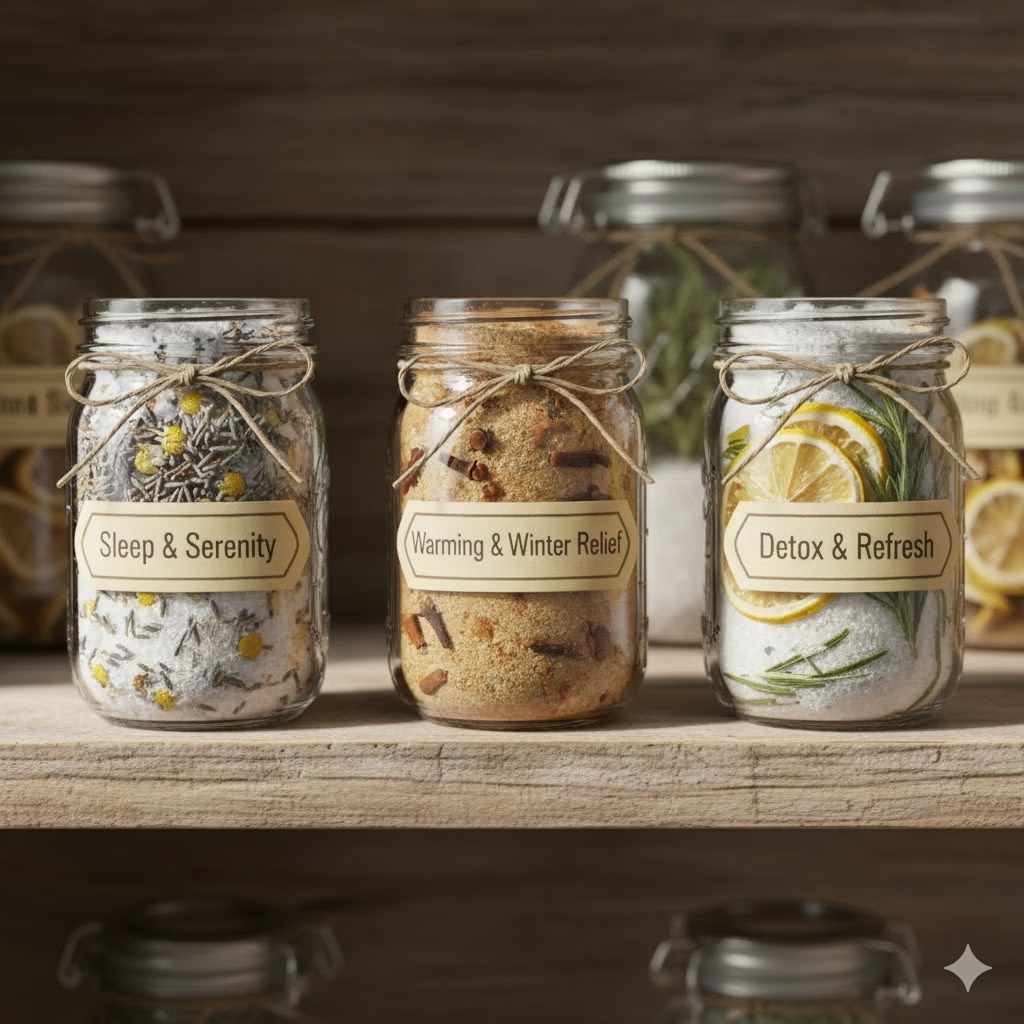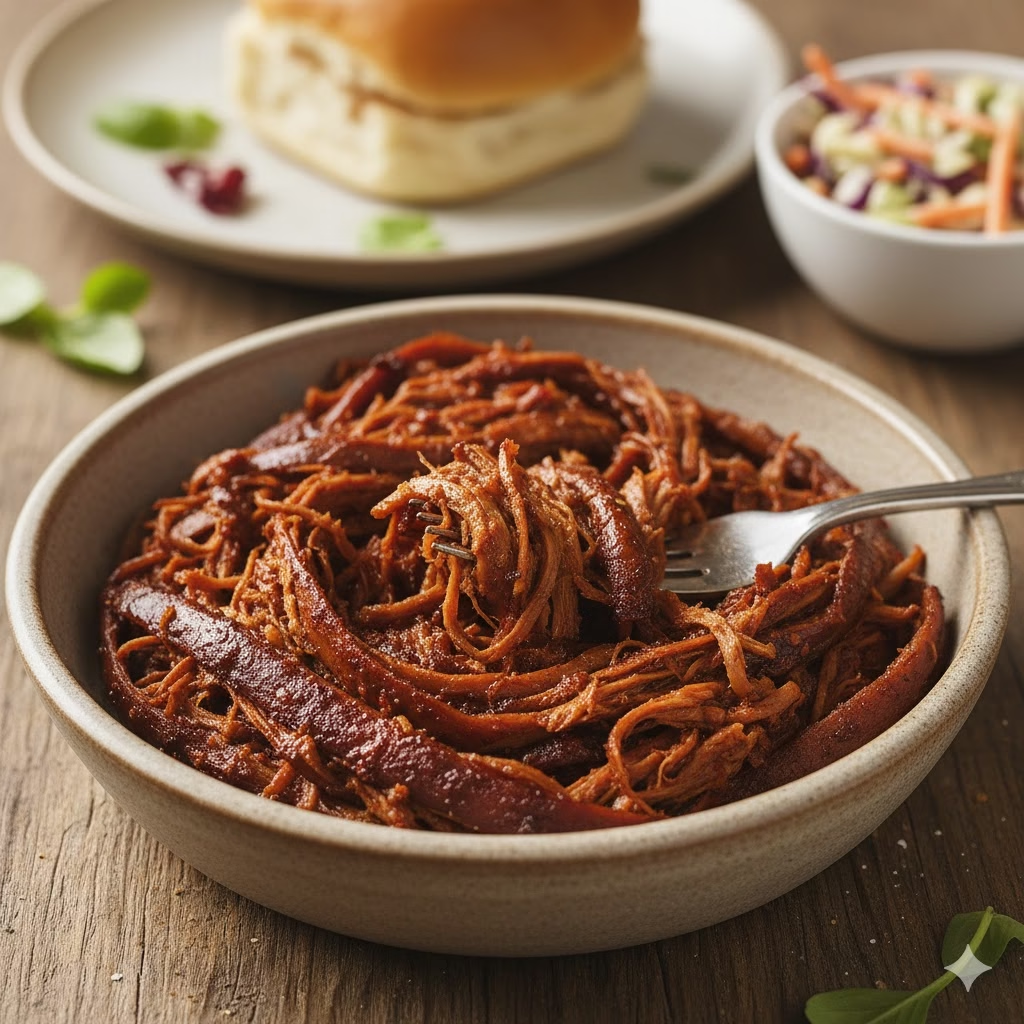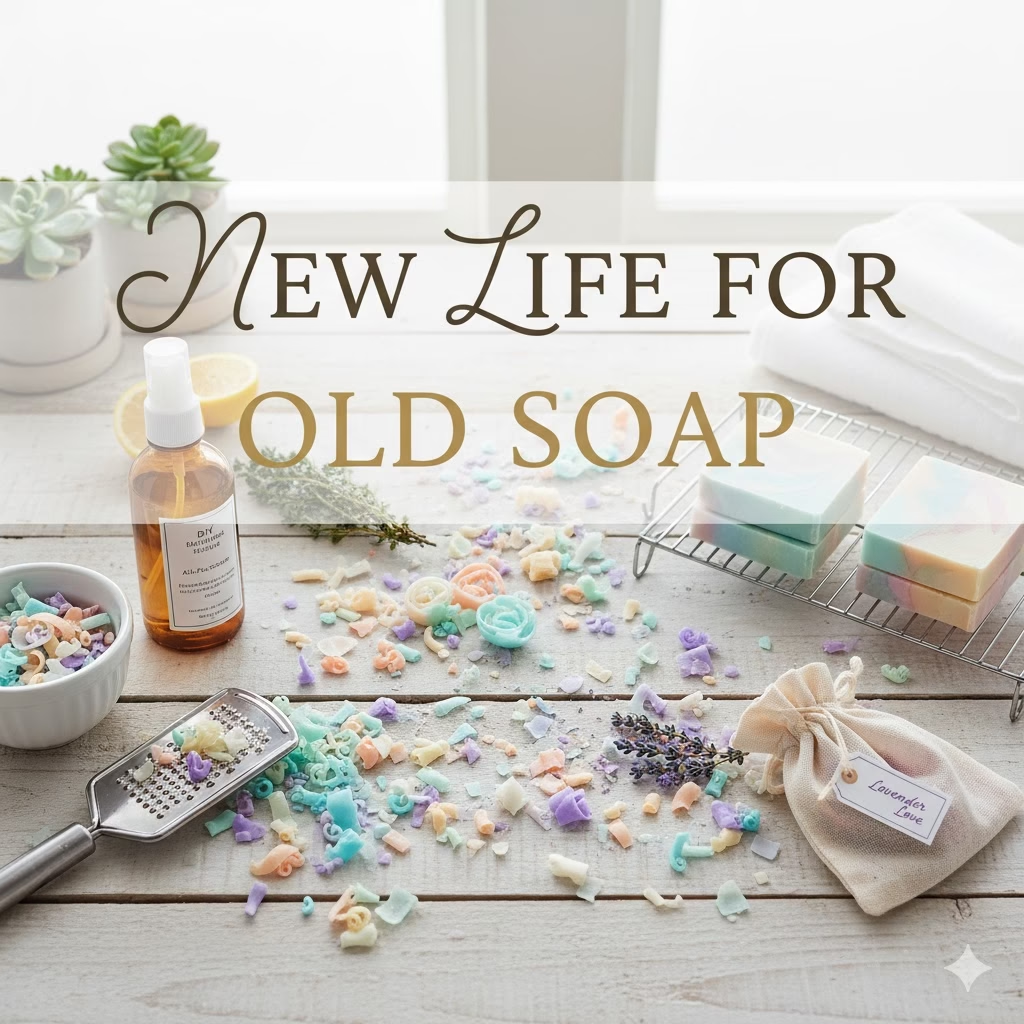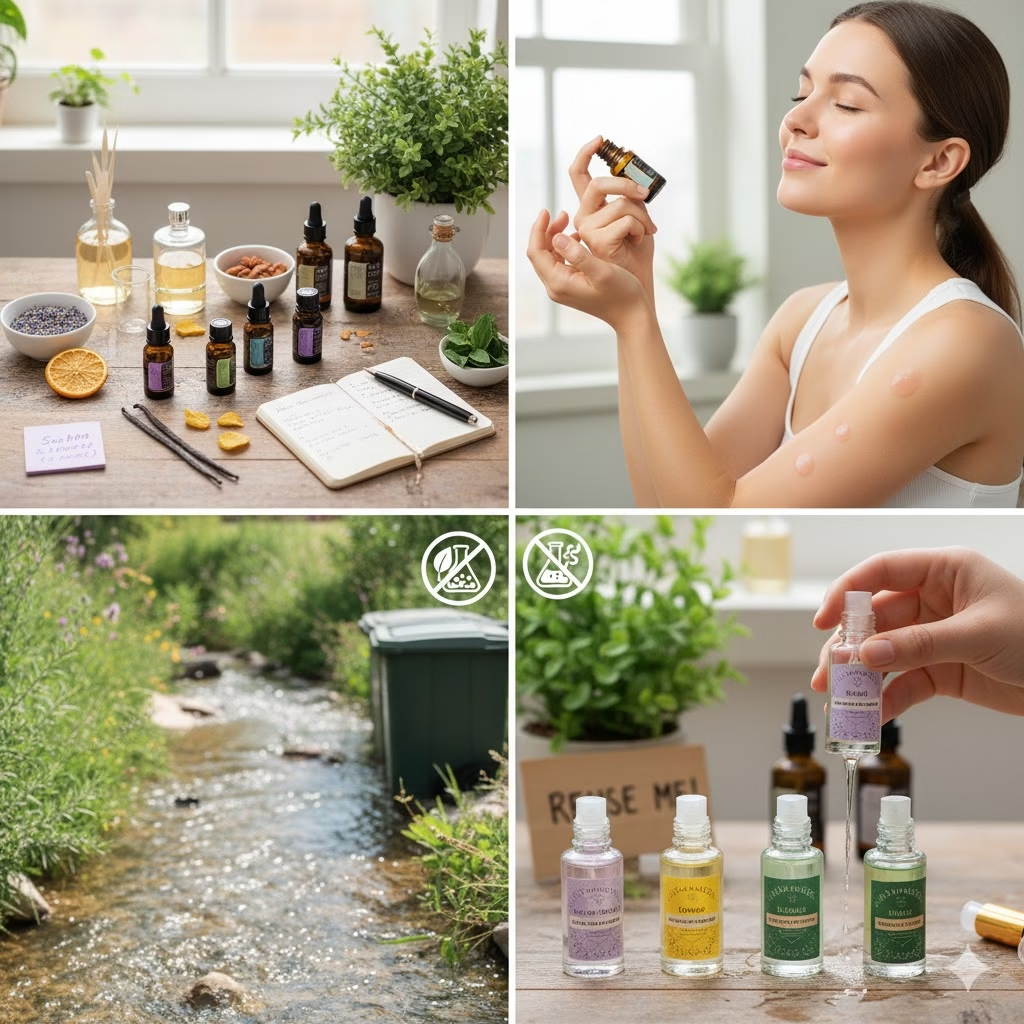
As someone who’s always sought out natural alternatives, I understand the frustration of finding products that are both effective and kind to your body. My journey into homemade beauty began when I decided to eliminate unnecessary Chemicals from my routine. Discovering the joy and benefits of DIY fragrances showed me a better way. Join me as we explore how easy it is to create beautiful, chemical-free scents that not only smell amazing but also nourish your well-being and the environment.
We all care about what we put into our bodies. It’s smart to also think about what we put on them. Perfume is a daily luxury for many people. It’s a finishing touch that makes you feel great. But most designer scents hide a secret. They contain a mix of synthetic chemicals. This cocktail can cause problems for your health and the environment.
There is a better choice. You can smell wonderful without risking your health or creating pollution. The solution is simple: make your own natural DIY fragrances. Making perfume at home is more than just a passing trend. It’s a thoughtful decision. It gives you total control over every ingredient. You avoid harmful synthetic chemicals. You choose a healthier, cleaner way to smell great.
The Natural Chemicals Free Choice: Health Benefits You Will Love

People switch from store-bought to homemade perfume because they want better health. When you decide to ditch the chemicals, you get many benefits. Synthetic fragrances simply cannot give you these advantages.
Avoid the Chemical Trap
Many commercial perfumes have a complex mix of synthetic compounds. These often come from petrochemicals. The word “fragrance” on a label can hide hundreds of secret chemicals. This is a loophole that lets companies protect their secret recipes. Some of these hidden ingredients are phthalates and parabens. They can cause many health issues. These range from skin irritation and allergies to serious hormonal problems.
You become the perfume creator when you make your own. So you ensure your scent is free from these harsh chemicals. You pick pure ingredients. This gives you peace of mind with every spray.
Better for Sensitive Skin
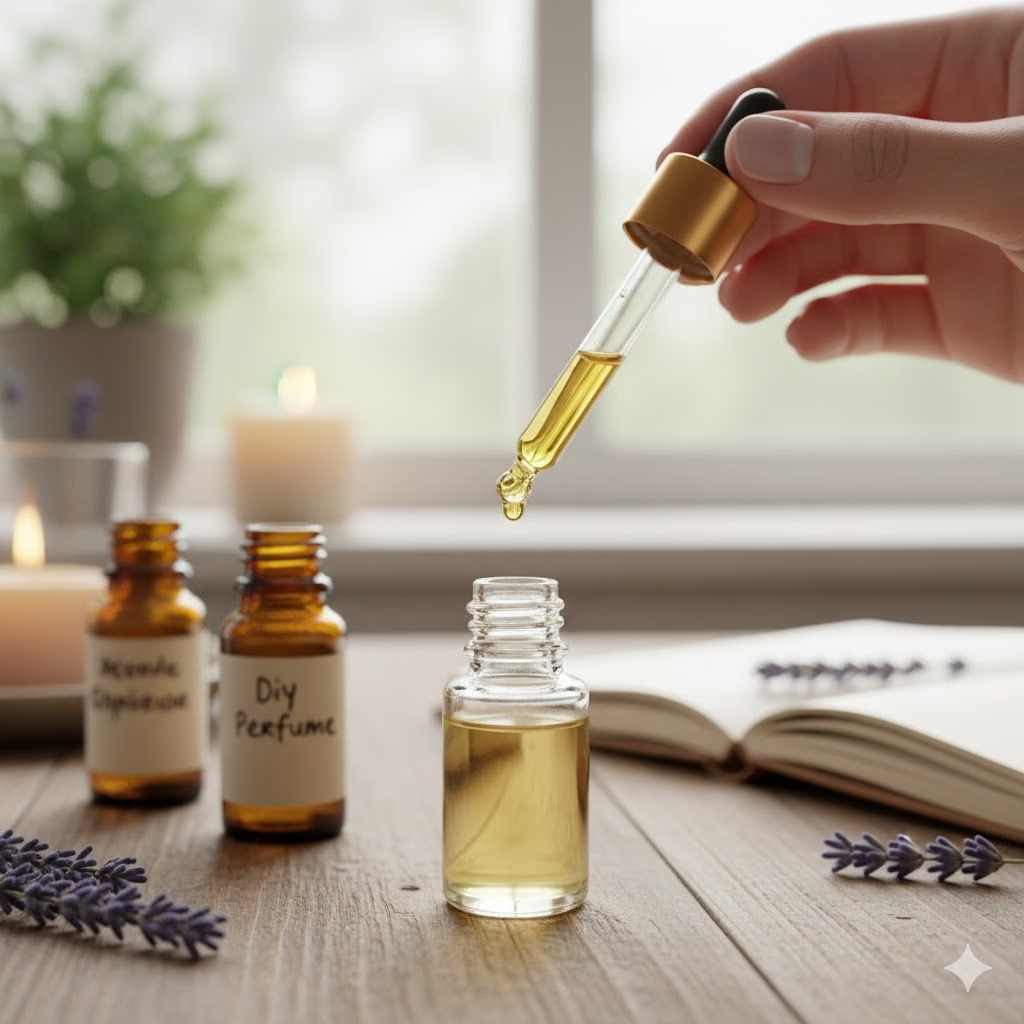
Synthetic chemicals that cause health worries are often the reason for skin problems. Do you have dry, sensitive, or allergy-prone skin? Store-bought perfumes can easily cause redness, dryness, or itchy rashes. Natural perfume ingredients are much gentler. This is especially true for pure, plant-based essential oils. Mix them properly with a good carrier oil like jojoba or fractionated coconut oil. Your DIY fragrance will be safer and non-irritating.
The Power of Aromatherapy
When you choose pure essential oils over lab-made scents, your perfume does more. It becomes a beautiful fragrance and a tool for wellness. This is one of the best health benefits. Commercial fragrances only cover up bad smells. Essential oils offer real aromatherapy benefits. They can directly improve your mood and well-being.
- Lavender is well-known for being very calming. Use it for a relaxing evening blend.
- Citrus oils (like sweet orange or grapefruit) are bright and energizing. They are great for a morning lift.
- Peppermint can help you focus and think clearly.
You intentionally choose your oils. This turns your daily spritz into a small moment of self-care.
Customize Your Subtle Scent
Have you ever been near someone wearing too much perfume? Store-bought perfumes often create a big “sillage,” or scent cloud. They use fixatives and synthetic boosters to do this. DIY perfumes are different. They use natural, heavier carrier oils. This keeps the scent more subtle and personal. The smell stays closer to your body. This is better for others who are sensitive to strong fragrances.
Chemicals Free for A Better Planet: Environmental Benefits

Choosing to ditch the chemicals in your perfume helps create a healthier planet. Homemade fragrance greatly cuts down on the environmental problems caused by the large beauty industry.
Less Pollution and a Smaller Footprint
Making perfume commercially uses a lot of energy and resources. This includes harvesting ingredients, chemical creation, processing, bottling, and shipping around the world. When you make perfume at home, you skip most of these steps that use up resources.
Many synthetic fragrances come from petrochemicals. These create fossil fuel emissions. These compounds can also stick around in our air, water, and soil as pollutants. Natural essential oils come from plants. If you source them responsibly, they are biodegradable. They don’t have these harmful effects on the environment.
Less Waste
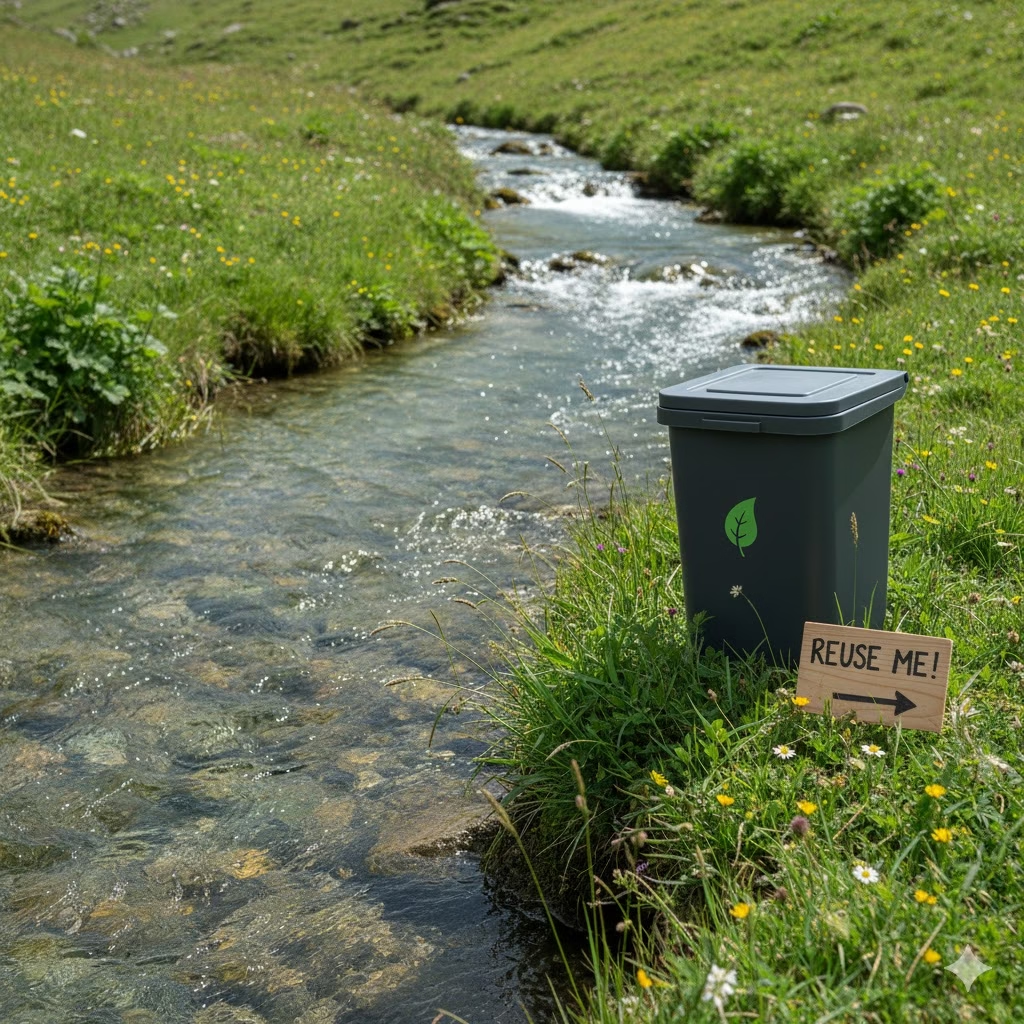
One easy way to be sustainable is to create less trash. You can make and store homemade perfume in reusable or refillable glass bottles. This simple change cuts out the need for plastic packaging, wrapping, and fancy boxes. These items come with most store-bought beauty products. You significantly reduce the waste you create.
Important Warnings: Ethics & Safety
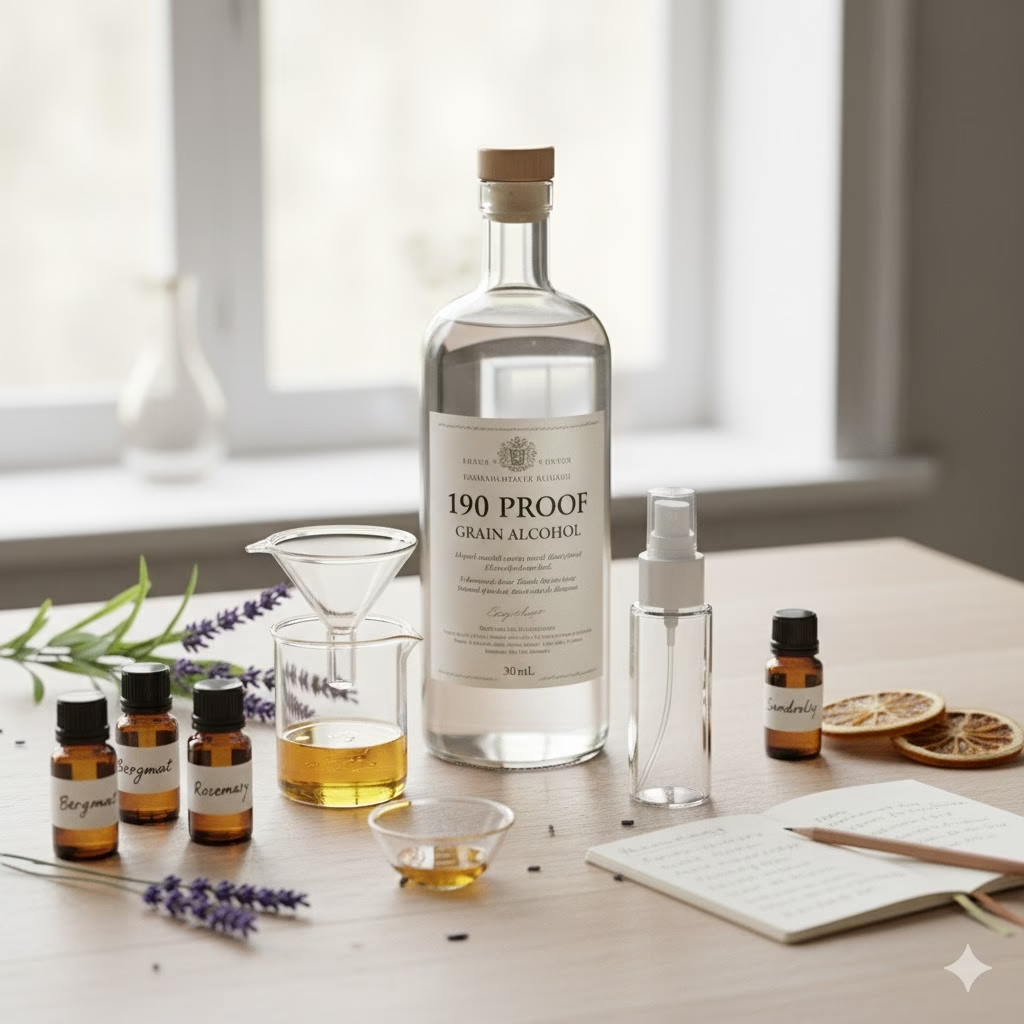
Keep in mind that “natural” is better than synthetic chemicals. But “natural” does not automatically mean zero risk. You must be careful and informed when you make your own products.
Safety: Essential Oils Are Strong
Essential oils are highly concentrated plant extracts. They are very strong. You must follow safety rules carefully. Ignoring them can cause irritation or injury.
- Allergies Are Possible: Even natural things can cause allergies. Oils like tea tree, lavender, and certain citrus oils can cause skin irritation or allergic contact dermatitis. You must always perform a patch test first. Put a tiny drop on a small spot of skin (like your inner arm). Only use the oil blend widely if there is no reaction.
- Sunlight Risk (Phototoxicity): Be very careful with cold-pressed citrus oils. This includes bergamot, lemon, lime, and sometimes grapefruit. If you put them on your skin and then go into direct sunlight or a tanning bed, they can cause bad reactions. This includes burns or blisters. Only apply these oils to areas of skin that will be covered. Or, use them only in blends you wear at night.
- Never Use Oils Undiluted: Do not ever put pure, undiluted essential oils right on your skin. This can cause severe irritation and damage. Always properly dilute essential oils in a carrier oil. A 2 to 3% dilution ratio is common for perfume.
Source Your Ingredients Ethically

The effect your perfume has on the environment depends on the ingredients you pick and where they come from.
- Unsustainable Farming: Many people want certain natural ingredients. This high demand can sadly lead to over-harvesting, cutting down forests, and soil damage. This is a known problem for valuable ingredients like sandalwood and agarwood (oud). Look for ingredients that are certified as ethically farmed or sustainably harvested.
- Fair Labor: Even common ingredients can have supply chain issues. For example, vanilla from Madagascar has had problems with fair pay for farmers. Research your suppliers. Choose those who are honest about their sourcing and their commitment to fair trade practices.
How to Make Your Natural DIY Fragrance
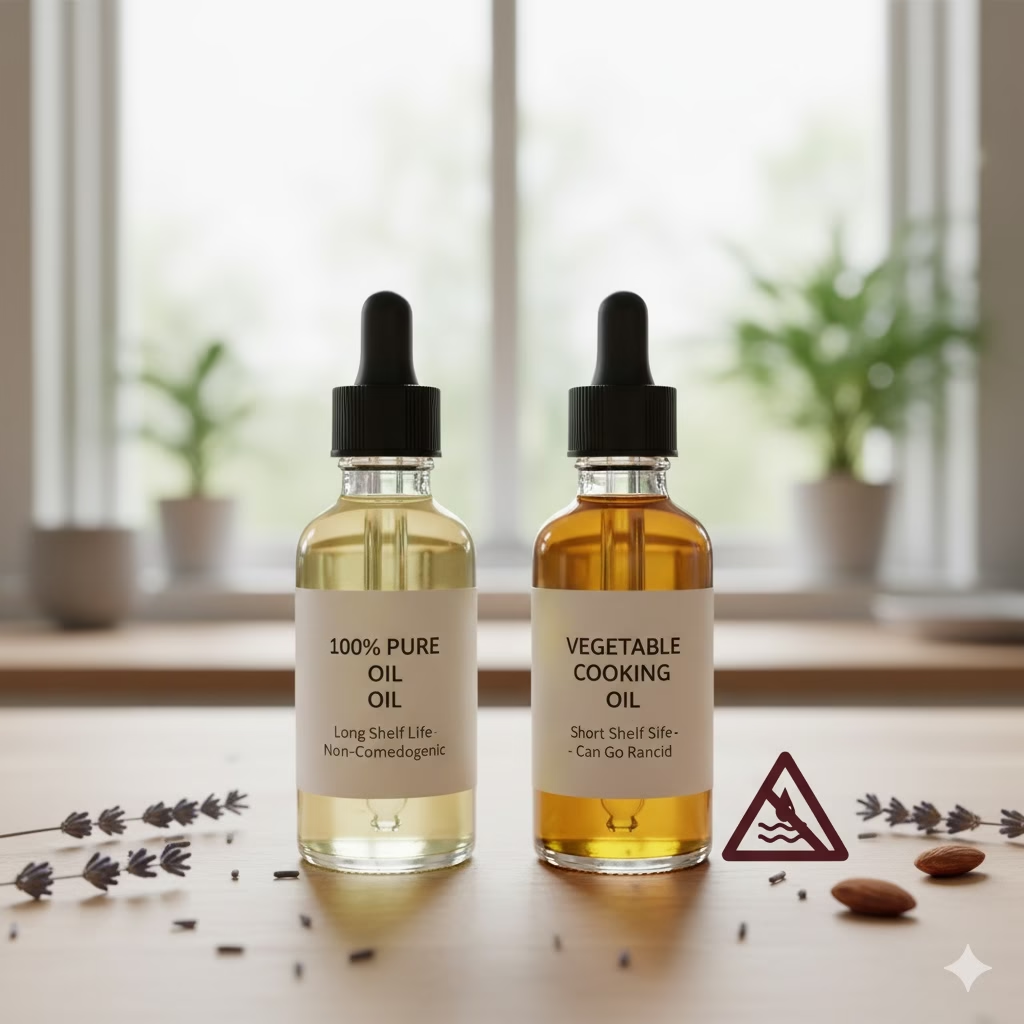
The best part of homemade perfume is the creativity. All perfumes use a structure called the “scent pyramid.” It has three kinds of notes: Top, Middle (Heart), and Base.
Step 1: Get Everything Ready
| Ingredient/Tool | What It Does | Tips |
| Essential Oils | The scent parts (Top, Middle, Base notes). | Make sure they are high-quality and pure. |
| Carrier Oil | Used to make the essential oils less strong. | Jojoba oil is best. It has no smell and lasts a long time. Coconut oil or almond oil also work well. |
| Vessel | A small glass roller bottle (10mL) or spray bottle (30mL). | Always use glass, because plastic can react with the essential oils. |
| Diluent (Optional) | Strong, clear alcohol (like 190 proof vodka) for a spray perfume. | You don’t need this if you are making a standard oil-based roll-on. |
Step 2: Learn the Scent Pyramid
A good perfume needs oils from all three groups. Try for a ratio of 20% Top, 50% Middle, and 30% Base notes.
| Note Category | How it Smells and Lasts | Examples |
| Top Notes (20% ) | Lightest smell, disappears fastest. This is the first thing you notice. | Citrus (Orange, Lemon, Bergamot), Peppermint, Eucalyptus. |
| Middle/Heart Notes (50% ) | The main body of the scent; lasts longer than the top note. | Floral (Lavender, Rose, Geranium), Spice (Nutmeg, Black Pepper), Herbaceous (Rosemary). |
| Base Notes (30% ) | Heaviest oils, last the longest. They hold the lighter scents in place. | Wood (Sandalwood, Cedarwood), Resins (Frankincense, Myrrh), Earthy (Patchouli, Vetiver), Vanilla. |
Step 3: Mix the Ingredients: Dilution
For a 10mL oil-based roll-on perfume, a safe amount of oil is typically 2 to 3% concentration.
- A 2% oil mix in a 10mL bottle: Use about 6 to 7 total drops of essential oil.
- For a 3% oil mix in a 10mL bottle: Use about 9 to 10 total drops of essential oil.
Step 4: The Mixing Process (Simple Recipe)
Recipe: Calming Lavender-Cedarwood Roll-On (10mL)
Target Total Drops: 10 Drops (3% Oil Mix)
- Add Base Notes: Start with 3 drops of Cedarwood (Earthy/Woody Base).
- Middle Notes: Add 5 drops of Lavender (Floral Middle/Heart).
- Add Top Notes: Finish with 2 drops of Sweet Orange (Uplifting Citrus Top).
- Fill the Bottle: Carefully fill the rest of the 10mL roller bottle with your Jojoba Carrier Oil.
- Mix and Let Sit: Close the cap tightly. Gently roll the bottle in your hands to mix the oils.
- Be Patient: The smell will get better over time. Let the perfume sit in a cool, dark spot for at least 1 week (or 2 to 4 weeks is best). This is called maceration. It lets the different scents blend together.
How to Make a Spray Perfume (Alcohol-Based):
For a spray, you need more oil (10 to 20%) and high-proof alcohol. The alcohol helps the oils dissolve and makes the scent travel in the air.
- Mix your essential oil blend (e.g., 60 drops for a 10% mix in a 30mL bottle) with about 25mL of high-proof alcohol.
- Shake it well. It might look cloudy at first.
- Let it sit for 1 week.
- Add 5mL of distilled water (or scented water called hydrosol) and shake gently.
- Allow the perfume to sit for a few weeks, shaking it now and then. The longer you wait, the better the scent will be.
Storage, How Long it Lasts, and Labels
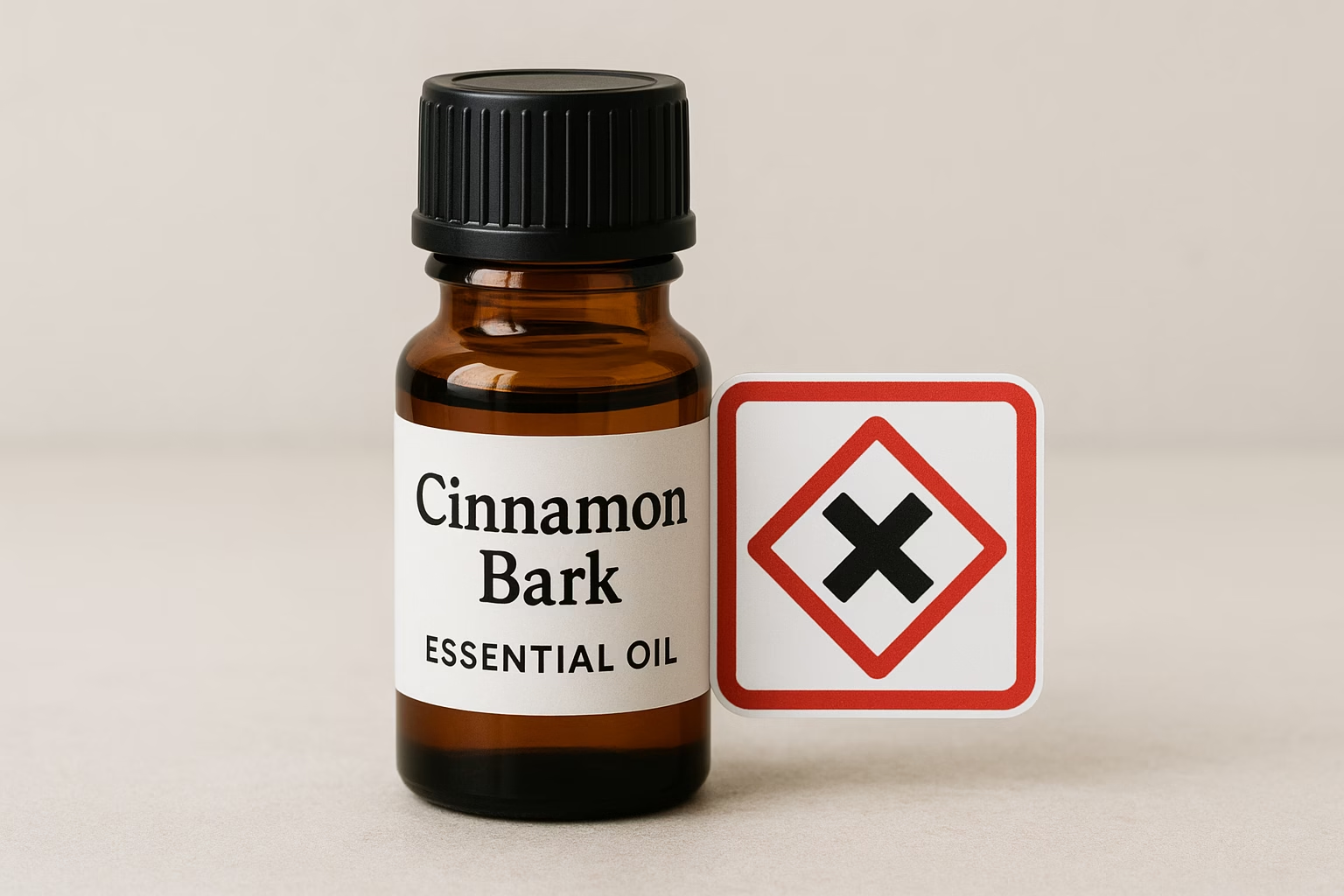
Homemade perfumes don’t have harsh chemical preservatives. You must store them correctly to keep them fresh.
- Storage: Always store your perfume in a cool, dark place. Keep it away from heat and direct sunlight, which can ruin the essential oils. Dark glass bottles offer the best protection.
- Longevity: A natural, oil-based perfume usually lasts 6 to 12 months. This depends on the carrier oil you use (jojoba lasts the longest). Alcohol-based perfumes may last longer because alcohol preserves the oils.
- Labeling: This is very important. Always label your bottle with the date you made it and the ingredients you used. This helps you know the shelf life. It also lets you know which oils caused a reaction if you have one.
Conclusion
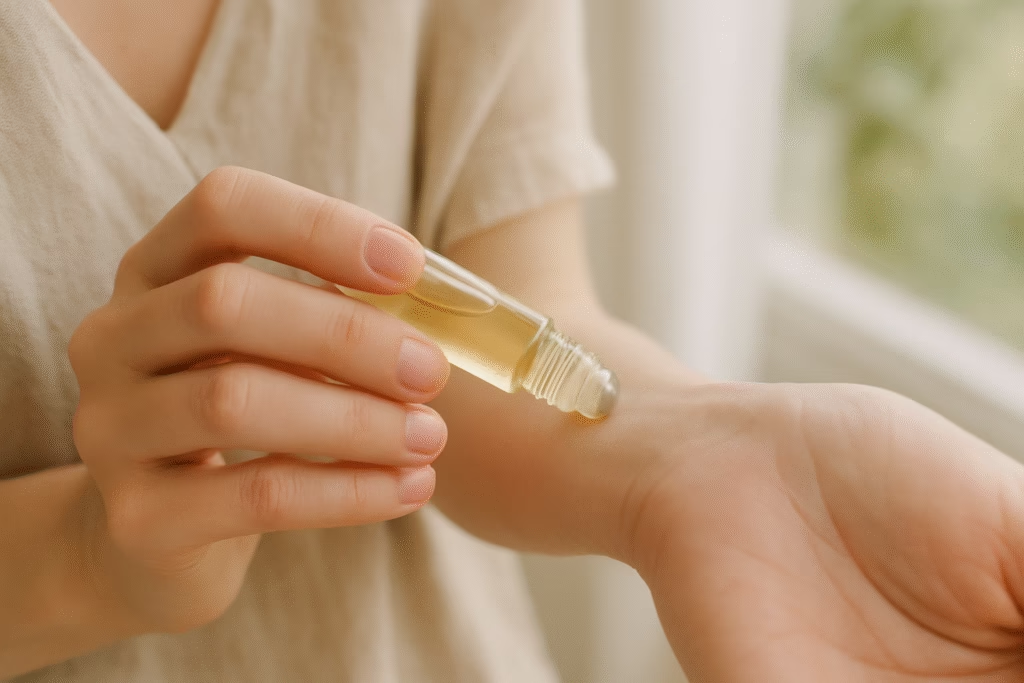
Choosing to ditch the chemicals and make your own natural fragrances is a great decision. It’s a healthy step for you and the environment. You turn a store-bought product into a personalized, non-toxic, and healing part of your day. Treat essential oils with care. Follow the safety and ethical rules. When you do this, you are not just making a perfume. You are taking back control of your health and helping create a cleaner world, one beautiful scent at a time.
Frequently Asked Questions (FAQ)
Q: Why do my DIY fragrances fade faster than commercial perfumes?
A: Store-bought perfumes use synthetic chemicals called fixatives. These are designed to make the scent last for hours. Natural perfumes, especially oil-based ones, fade faster. To make yours last longer, make sure your mix has a strong amount of Base Notes. Heavy oils like Sandalwood, Vetiver, or Frankincense hold the lighter scents on your skin.
Q: Can I use olive oil or vegetable oil as a carrier oil?
A: You could use some cooking oils, but it’s not a good idea. Oils like olive oil have a strong natural smell that will mess up your perfume. Also, most vegetable oils (like grapeseed or sunflower) spoil quickly. They will go rancid, which ruins your perfume. Jojoba oil is the best choice because it is odorless and does not spoil easily.
Q: Are there any oils I should never use in a DIY perfume?
A: Yes. Don’t use oils meant only for internal use. For skin use, strictly avoid oils that can be dermally toxic or very irritating. Examples are Cinnamon Bark or Clove Bud. Use them only in tiny amounts, and never on your face. Also, be careful with the phototoxic citrus oils if you plan to go out in the sun. Always check an oil’s safety information before you mix it.
Q: How do I know if my essential oils are high quality?
A: Look for oils labeled as 100% pure therapeutic grade. Good companies will share Gas Chromatography/Mass Spectrometry (GC/MS) reports for their oil batches. These reports prove the oil’s purity and its chemical makeup. Avoid oils that say “fragrance oil” or “perfume oil.” These often contain the synthetic chemicals you are trying to avoid.
Reference Section
Resources for Further Reading and Safety
Recent Posts
